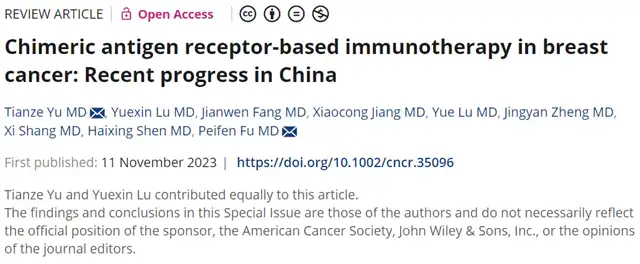CAR-Based Immunotherapy Advances in Breast Cancer
- Normal Liver Cells Found to Promote Cancer Metastasis to the Liver
- Nearly 80% Complete Remission: Breakthrough in ADC Anti-Tumor Treatment
- Vaccination Against Common Diseases May Prevent Dementia!
- New Alzheimer’s Disease (AD) Diagnosis and Staging Criteria
- Breakthrough in Alzheimer’s Disease: New Nasal Spray Halts Cognitive Decline by Targeting Toxic Protein
- Can the Tap Water at the Paris Olympics be Drunk Directly?
CAR-Based Immunotherapy Advances in Breast Cancer
- Should China be held legally responsible for the US’s $18 trillion COVID losses?
- CT Radiation Exposure Linked to Blood Cancer in Children and Adolescents
- FDA has mandated a top-level black box warning for all marketed CAR-T therapies
- Can people with high blood pressure eat peanuts?
- What is the difference between dopamine and dobutamine?
- How long can the patient live after heart stent surgery?
CAR-Based Immunotherapy Advances in Breast Cancer
Breast cancer is a malignant tumor with high incidence and tumor-related mortality worldwide. Despite various existing treatment methods for breast cancer, overall treatment outcomes are not entirely satisfactory.
T cells, natural killer (NK) cells, and macrophages (M) are crucial components of the immune system.
Currently, novel cell therapies centered around Chimeric Antigen Receptor (CAR) technology, such as CAR-T, CAR-NK, CAR-M (collectively referred to as “CAR series therapies”), have emerged as promising approaches in the immunotherapy of tumors.
It is noteworthy that while CAR series therapies have made remarkable progress in the treatment of hematologic malignancies, their research progress in breast cancer lags behind.
Recently, a review published in the Cancer journal comprehensively detailed the latest advancements in CAR technology-based immunotherapy for breast cancer, focusing on tumor antigen targets, breast cancer subtype characteristics, tumor microenvironment (TME), and combination therapy strategies.

Breast cancer, being a prevalent cancer, is increasingly seeing the application of immunotherapies centered around CAR technology in clinical management, in addition to traditional treatments.
The review emphasizes that immunoresistance limits the application of CAR series therapies in breast cancer treatment. The “tumor heterogeneity” resulting from overexpressed tumor antigens is identified as a major challenge for CAR series therapies. In breast cancer, many tumor antigens, such as Human Epidermal Growth Factor Receptor 2 (HER2) and Mucin 1 (MUC1), are often overexpressed. Additionally, tumor antigen escape mechanisms, including downregulation, immunogenicity restrictions, and low expression of MHC in tumor cells, contribute to the development of immunoresistance to CAR series therapies.
The TME is another significant factor contributing to immunoresistance in CAR series therapies. TME can impact both tumor cells and immune effector cells. Interactions between anti-tumor immune cells (such as T cells and NK cells) and immunosuppressive cells (such as M2-like tumor-associated macrophages [TAMs]) lead to the creation of an immunosuppressive environment in breast cancer.
Recent Advances in CAR Series Therapies
The review highlights that glycoprotein antigens such as Human Epidermal Growth Factor Receptor (HER, including HER1), Mesothelin (MSLN), and Trophoblast Cell-Surface Protein 2 (TROP2) are promising targets for CAR-T therapy in breast cancer.
HER1, also known as Epidermal Growth Factor Receptor (EGFR), plays a crucial role in regulating the growth, survival, and invasion of tumor cells. EGFR is highly expressed in triple-negative breast cancer, making it one of the most effective targets for CAR-T therapy in breast cancer.
Moreover, another molecule from the HER family, HER3, is associated with oncogenic signaling and treatment resistance in breast cancer. A study published in Cancer Immunol Immunother in 2018 demonstrated the potent tumor-killing effect of HER3-CAR-T therapy in tumor models.
EGFR and MSLN are potential targets for CAR-NK therapy. A 2020 study published in Cell Prolif. revealed that EGFR-CAR-NK cells effectively induced lysis of triple-negative breast cancer cells in vitro. Another study in 2023, published in J Immunother., demonstrated that MSLN-CAR-NK cells effectively killed triple-negative breast cancer cell lines, slowed tumor growth in a mouse model, and lysed specific primary cells or organs from triple-negative breast cancer patients.
Additionally, research indicates that Vascular Endothelial Growth Factor Receptor-2 (VEGFR2)-CAR-M therapy enhances the inhibitory ability against tumor cells in vitro and inhibits tumor progression in vivo without significant side effects.
Future Directions of CAR Series Therapies: Combination Therapy
The review suggests that combination therapies, such as combining PD-1 antibodies with oncolytic viruses, radiotherapy, PARP inhibitors, and Histone Deacetylase Inhibitors (HDACi), are expected to enhance the killing effect of CAR-T cells on breast tumor cells.
A study published in 2019 demonstrated that combining immune checkpoint inhibitors with MSLN-CAR-T cells had a significant advantage in controlling solid tumors. In vitro studies showed a substantial increase in the killing effect on cancer cells, and in vivo studies demonstrated enhanced control over tumors and prevention of disease recurrence.
Another study published in J Immunother Cancer in 2023 showed that Tumor Necrosis Factor-α (TNF-α)-CAR-T cells had potent anti-tumor effects, enhancing the efficacy of PD-1 antibody treatment for breast cancer both in vitro and in vivo.
In Conclusion
The differences in tumor antigens, subtypes, and the immunosuppressive TME in breast cancer patients contribute to tumor heterogeneity, making the application of CAR series immunotherapies lag behind.
Combination therapies, such as immune checkpoint inhibitors and oncolytic viruses, are expected to overcome these obstacles in breast cancer treatment.
Importantly, several CAR technology-based breast cancer immunotherapies have progressed to clinical trials.
CAR-Based Immunotherapy Advances in Breast Cancer
(source:internet, reference only)
Disclaimer of medicaltrend.org
Important Note: The information provided is for informational purposes only and should not be considered as medical advice.



